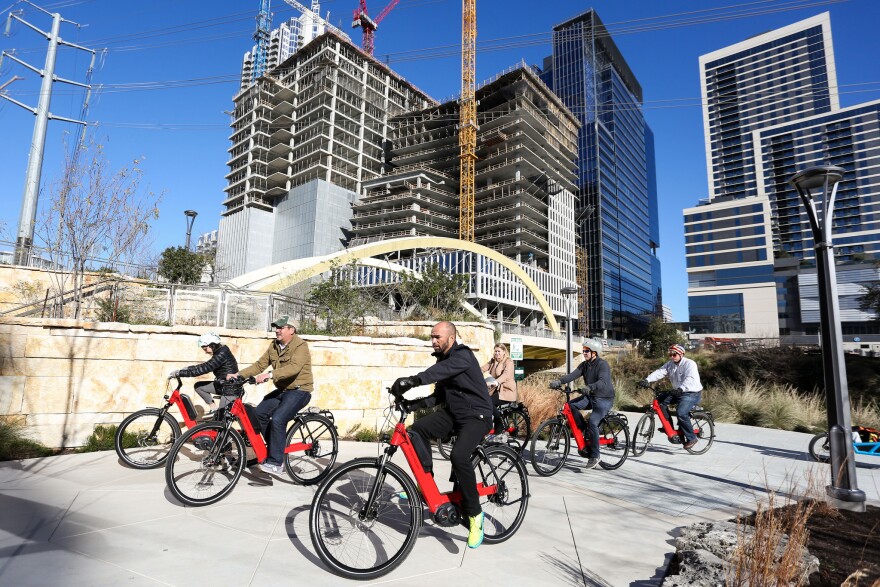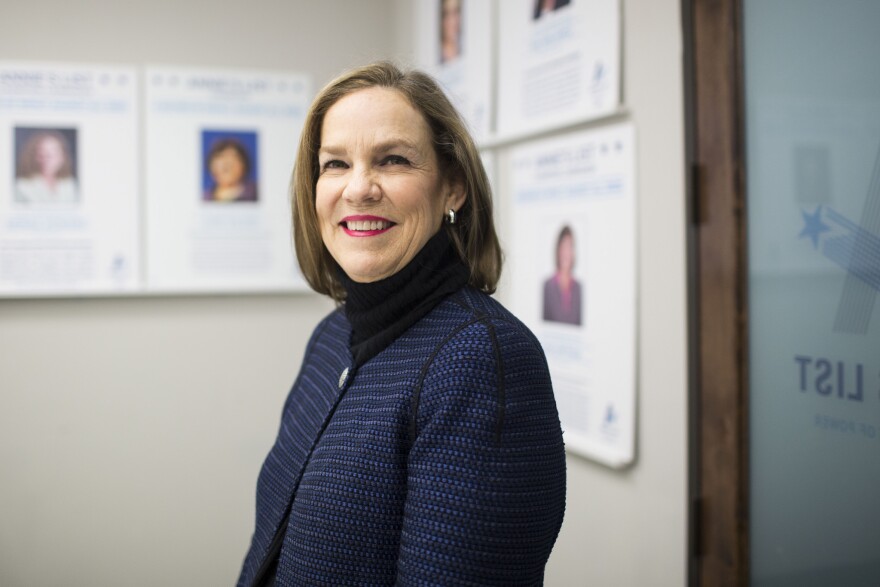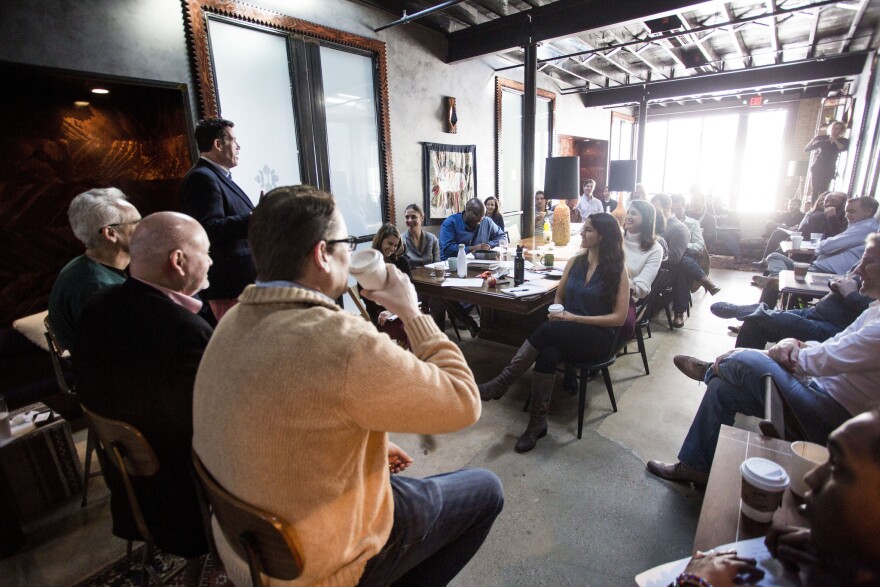It’s 5 p.m. on a Friday at Native, a new bar and hostel in East Austin. Half a dozen people occupy the blue velvet booths and alternative dance music blares overhead. Leigh Salinas walks in carrying a duffel bag. She’s there to spend the weekend studying – sort of.

“I was certainly impacted by the presidential election in a lot of the ways that other people were,” says the 31-year-old, who works as an accountant for a local food company. Despite never stepping inside City Hall, she says she has aspirations of running for local office one day. “It’s easier, at least at first, to make a change at a local level. So, that’s why I’m super excited about this program specifically.”
Salinas is one of 25 participants in the inaugural ATXelerator, run by the nonprofit The Center for Austin’s Future. The idea is to train and educate potential candidates for local office – specifically Austin City Council or various city boards and commissions.
The program begins with a weekend retreat where participants sleep, eat and learn together at a hostel. There are six bunk beds to a room, each with one toilet and a shower. The bunks have a curtain, providing a little privacy.
“I’ve had quite extensive ... hostel experience,” says Salinas, who traveled through parts of Europe as a college student. “This is by far the nicest.”
Candidate School Meets Tech Start-Up
What makes ATXelerator different from other candidate schools is that it’s also part tech accelerator. Where normally you’d be pitching a business and vying for investor money, here you’re pitching yourself as a candidate for local office.

“Competition brings out the best in people,” says Ward Tisdale, the executive director of the center. Participants take six classes, once a week on various city issues, including land use, finance and social equity. At the end of those weeks, each person will pitch to a panel.
“The competition is really meant to have people up their game and test them,” he says. While it’s not certain that this year's winner will get campaign funding from the nonprofit, it's a possibility down the road.
Amos Schwartzfarb is the managing director of Techstars in Austin, one of the first startup accelerators, along with Y Combinator in Cambridge, Mass. While tech accelerators have cropped up in just the past decade, Schwartzfarb says the idea – a period of time spent intensively studying something and then competing to win a title – is nothing new.
“I think back to when I was a kid and as an athlete,” he says. “Over the summers and over Thanksgiving breaks, I would go to these immersive camps, and the idea was you’ll learn more and get fitter in two or three weeks than you would over the course of a full season, because this is all you do. You live, eat, breathe, sleep it all day long.”
Schwartzfarb says he’s never heard of a tech-accelerator model being applied to local politics.
“I think it’s not only a cool idea, I think it’s an extremely timely idea,” he says. “The thought of the average person having more than just a vote as their political voice is not something that most people thought about [until the 2016 election].”
A Certain Type Of Candidate
Participants in the ATXecelerator spend most of the weekend listening to experts on local media, Austin’s history or the city’s demographic future. They also socialize, which includes a trip to Esther’s Follies
Then there's the three-hour electric bike tour around the city.
“I have never ridden an electric bike,” Salinas says. “I’m in uncharted waters.”

The group rides to the new Austin Central Library and through the Seaholm district, where a power plant has been replaced by high-rise apartments, restaurants and a Trader Joe’s. They also ride by Plaza Saltillo, a more than 10-acre lot on which 800 apartments – including low-income housing – retail and office space is being built.
Tisdale says the tour is meant to showcase the way Austin should be building as it grows.
“Mixed use is definitely the best way to develop. It’s the way we used to develop decades ago,” says Tisdale, who worked in global affairs for a local tech company and served as president of the Real Estate Council of Austin for three years.
“What’s key to Austin is not greenfield development; it’s how we reuse the assets that we have," he says. "And that’s going to be critical in the years to come as more people move here, and we need to find a creative and efficient way to house them."
In the same way that organizations like Emily’s List prep Democratic women to run for office, ATXelerator is looking for a specific candidate – one who generally espouses the ideals of building environmentally friendly and walkable development through denser construction and a larger variety of housing types.
But this type of development makes some longtime Austin residents anxious, as mixed-use buildings have replaced businesses and homes in historically working-class East Austin.
“We are growing – a hundred people move here a day – and in order to preserve what we have in Austin, which is a great quality of life, we have to change,” Tisdale says. “And if we don’t change, we’re going to become an elitist city where only the rich can live, and it will be predominantly white and not diverse.”

The average ATXelerator participant is 35 years old. Their career paths vary – there’s a writer, the owner of a pet-sitting business, a city planner and a community college student. Just getting selected to participate is a competition – the current group of 25 was whittled down from 48 applicants.
Annie’s List trains women and contributes to their campaigns for state and local office. Executive Director Patsy Woods Martin says the organization doesn't have an application process – by design.
“Women have a hard time deciding to run for office, and so we want to provide the opportunity to understand the process to as many people as possible,” she says. “It’s really important for us … to have that funnel open as wide as possible.”
Pitch Yourself
The ATXelerator weekend retreat closed Sunday afternoon after a panel on how to run a campaign, featuring former Austin Mayor Lee Cook and a speech from state Sen. Kirk Watson.
Tisdale ends the weekend with some housekeeping.
“Just take all your crap,” he jokes. “This is it. Let’s go.”
Salinas packs up the things from her bunk, doing a quick scan of the room to make sure she has everything. Then she explains how she might pitch herself as a candidate for local government.
“I’m from the business community,” she says. “One thing former Mayor Lee Cook kept bringing up was infrastructure, but also understanding the financial position of our city, understanding our debt and understanding the economics. And I think that’s something the business community does all day long. ... I’ve just been thinking about how can I take my business skill set and my accounting skill set and my acumen with numbers and business and apply it to these city problems.”
But first, she says, she's going home to take a nap.


